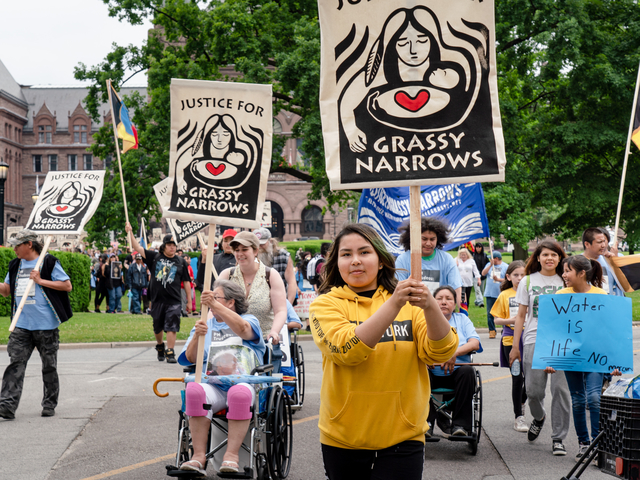Amnesty International campaign shines global spotlight on Indigenous youth fighting mercury crisis
WINNIPEG – Indigenous youth and mercury survivors from Grassy Narrows First Nation will be the focus of Amnesty International’s largest worldwide letter-writing campaign this year, the human rights organization announced today.
The annual Write for Rights event, which takes place around International Human Rights Day Dec. 10, is highlighting 10 cases of young people around the world who are experiencing human rights abuses, including the Indigenous Anishinaabe youth from the northwestern Ontario First Nation.
These youth are seeking justice for Grassy Narrows First Nation, also known as Asubpeeschoseewagong, a community that has been exposed to mercury poisoning for five decades. In the 1960s and 1970s, a pulp mill dumped 10 tonnes of mercury into the English-Wabigoon River system upstream from Grassy Narrows. Today, the community’s vital waterways and fish are still contaminated, and people are still living with the devastating aftermath, including health problems, the loss of their jobs, and the erosion of their cultural traditions.
“I have trouble speaking. I have speech impairments. I have learning disabilities,” said Steve Fobister, also known as Darwin, a 22-year-old mercury survivor. “But like my late grandfather, Steve Fobister Sr., I will never give up until our waters are clean and our fish are safe to eat.”
Amnesty International’s Write for Rights campaign invites people around the world to write messages of support to Grassy Narrows youth, and send letters to the Canadian government demanding concrete action. Like their parents and grandparents, Grassy youth are asking federal officials to build a mercury treatment facility and properly compensate community members.
“We will not stand by and let people die,” said Paris Meekis, a 15-year-old activist from Grassy Narrows, adding that the community’s youth are fighting for a “brighter, better future for future generations.”
Thirteen-year-old Jianne Turtle is following in the footsteps of her father, Grassy Narrows Chief Rudy Turtle, in calling for the government to take concrete action. She said Prime Minister Justin Trudeau “should keep his promise” to address the mercury crisis.
“Mr. Trudeau, you have another chance to do something. Please do it,” she said. “Do it for all the people of Grassy Narrows and our future generations.”
Rodney Bruce, a 25-year-old member of Grassy Narrows, who is also part of the First Nations Climate Change Adapt Program at the Kenora Chiefs Association, said fishing is important to him, and his community.
“Grassy is a beautiful place, but there’s a cloud over our heads – it’s the mercury poisoning,” he said. “Mercury is not a physical thing you can see. It’s in the symptoms.”
Amnesty International has been fighting alongside Grassy Narrows for years, but this is the first time the organization is putting the First Nation in the global spotlight.
“We’re calling on human rights activists from around the world to show their support for Grassy Narrows,” said Ana Collins, Amnesty International Canada’s Indigenous Rights Campaign Advisor. “It’s unacceptable that youth are now having to fight for the right to live in a healthy environment, nearly 50 years since the Canadian government first became aware of the mercury crisis. The time for concrete action is long overdue. We’re hoping Amnesty’s global movement will help drive home the point that governments must respect Indigenous rights and future generations of Grassy Narrows youth must not be exposed to mercury poisoning.”
Write for Rights background:
Last year, Amnesty International sent 5.9 million letters, petitions, tweets, and solidarity messages from around the world in support of women human rights activists, who were the focus of the 2018 campaign. This year’s Write for Rights event is focused on youth under the age of 25.
Write for Rights events will be taking place across Canada from late November until mid-December. More information can be found at writeathon.ca.
Media contact: Lucy Scholey, Media Relations, Amnesty International Canada (English branch), 613-853-2142, lscholey@amnesty.ca






















